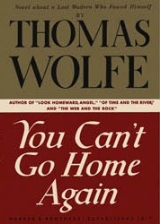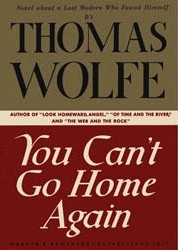
You Can't Go Home Again
Encyclopedia

Thomas Wolfe
Thomas Clayton Wolfe was a major American novelist of the early 20th century.Wolfe wrote four lengthy novels, plus many short stories, dramatic works and novellas. He is known for mixing highly original, poetic, rhapsodic, and impressionistic prose with autobiographical writing...
. It was published posthumously in 1940 from the October Fair manuscript. The novel tells the story of George Webber, a beginning author, who writes a book that makes frequent references to his home town of Libya Hill. When the residents of Libya Hill read the book and see the egregious distortions Webber penned, they begin sending Webber death threats and menacing letters expressing their discontent with the novel, even though it is held in high regard in the rest of the country. Wolfe, as in many of his other novels, explores the themes of a changing America, including the stock market crash and the illusion of prosperity, and the unfair passing of time, which inhibits George from ever being able to go "home again". The book is one of his more popular novels, along with Look Homeward Angel.
The title comes from the finale of the novel when protagonist George Webber realizes, "You can't go back home to your family, back home to your childhood ... back home to a young man's dreams of glory and of fame ... back home to places in the country, back home to the old forms and systems of things which once seemed everlasting but which are changing all the time – back home to the escapes of Time and Memory."
“You can’t go home again” has entered American speech to mean that after you have left your country town or provincial backwater city for a sophisticated metropolis, you can’t return to the narrow confines of your previous way of life, and, more generally, attempts to relive youthful memories will always fail. Susan Matt has suggested that the phrase is sometimes spoken to mean that you can’t return to your place of origin without being deemed a failure. In this regard, the phrase is used as a self-admonition or warning. You can’t go home again ambitious Americans tell themselves. They say it as a warning to stick it out, to not dare go home and subject themselves to the prospect of being a failure in the eyes of their family and the friends of their youth.
In popular culture
- In the Peanuts episode entitled Snoopy's Reunion, Sally says to Charlie Brown, "You know big brother what's his name is right, you can't go home again." This was said after they realized that the city had built a parking lot over Daisy Hill Puppy Farm.
- In the X-Men: The Animated SeriesX-Men (TV series)X-Men, also known as X-Men: The Animated Series, is an American animated television series which debuted on October 31, 1992, in the United States on the Fox Network as part of its Fox Kids Saturday morning lineup...
episode "Days of Future Past – Part 1", RogueRogue (comics)Rogue was first slated to appear in Ms. Marvel #25 , but the book's abrupt cancellation left her original introduction story unpublished for over a decade, before seeing print in Marvel Super Heroes #11 in 1992. Rogue's first published appearance was in Avengers Annual #10...
and GambitGambit (comics)Gambit is a fictional character, a Marvel Comics superhero that has been a member of the X-Men. Created by writer Chris Claremont and artist Jim Lee, the character first appeared briefly in Uncanny X-Men Annual #14 , weeks before a more comprehensive appearance in Uncanny X-Men #266...
give a copy of the novel to BeastBeast (comics)Beast , Dr. Henry Philip "Hank" McCoy, is a comic book character, a Marvel Comics superhero and a member of the mutant team of superheroes known as the X-Men...
while visiting him in jail. Beast recalls Thomas Wolfe and fondly describes the book as an old favorite. Gambit remarks that Beast is easy to shop for, saying "just buy the books that have the most dust on them." The episode explores similar themes on the passing of time as dealt with in the novel. - DJ ShadowDJ ShadowJoshua Paul Davis better known as DJ Shadow is an American music producer, DJ and songwriter. He is considered a prominent figure in the development of instrumental hip hop and first gained notice with the release of his highly acclaimed debut album Endtroducing....., which was constructed...
included a track of the same name on his 2003 album The Private PressThe Private PressThe Private Press is the second full-length studio album by DJ Shadow, released on June 2, 2002 on MCA. Although not as critically well-received as his 1996 debut breakthrough Endtroducing..., The Private Press still received universal acclaim....
. - On Straylight RunStraylight RunStraylight Run was an indie rock band based in Baldwin, New York. Two of the members, Nolan and Cooper, had been members of Taking Back Sunday and have now rejoined that band. Their final releases are the EPs About Time and Un Mas Dos, preceded by the full-length album entitled The Needles The...
's 2004 self-titled album, the song "Mistakes We Knew We Were Making" uses the title You Can't Go Home Again as lyrics in the bridge. The song deals with similar themes as well. - John SteinbeckJohn SteinbeckJohn Ernst Steinbeck, Jr. was an American writer. He is widely known for the Pulitzer Prize-winning novel The Grapes of Wrath and East of Eden and the novella Of Mice and Men...
refers fondly to the book in his novel Travels with Charley: In Search of AmericaTravels With Charley: In Search of AmericaTravels with Charley: In Search of America is a travelogue written by American author John Steinbeck. It recounts tales of a 1960 road trip with his French standard poodle, Charley, around the United States. He wrote that he was moved by a desire to see his country on a personal level, since he...
when he returns to his home in California's central coast. - You can see the title of the book written on a wall in the clip for SuedeheadSuedehead"Suedehead" was the debut solo single from Morrissey, released in February 1988.The single charted higher than any of the singles released by his former band The Smiths, reaching number five in the UK Singles Chart. It charted at #30 in The Netherlands and at #8 in New Zealand...
by singer MorrisseyMorrisseySteven Patrick Morrissey , known as Morrissey, is an English singer and lyricist. He rose to prominence in the 1980s as the lyricist and vocalist of the alternative rock band The Smiths. The band was highly successful in the United Kingdom but broke up in 1987, and Morrissey began a solo career,...
. - In Stephen KingStephen KingStephen Edwin King is an American author of contemporary horror, suspense, science fiction and fantasy fiction. His books have sold more than 350 million copies and have been adapted into a number of feature films, television movies and comic books...
's novel, The Dark Tower III: The Waste Lands, the character Eddie Dean has a dream in which he is holding "You Can't Go Home Again, by Thomas Wolfe", but the cover art and content are not Wolfe's. - "You Can't Go Home Again" (along with "Look Homeward Angel") is the answer to a high school quiz bowl question on a season 4 episode of the television show Friday Night LightsFriday Night Lights (TV series)Friday Night Lights is an American sports drama television series adapted by Peter Berg, Brian Grazer and David Nevins from a book and film of the same name. The series details events surrounding a high school football team based in fictional Dillon, Texas, with particular focus given to team...
. - In the beginning of Steve Earle's "Hometown Blues," the singer says: "This here's my hometown blues, with apologies to Thomas Wolfe and Doc Watson."
- The ABC Movie of the Week broadcast an adaptation starring James Franciscus in the 1960s. It was noted the script was based on Wolfe's novel.
- Country singer Don Williams alludes to the novel in his song "Good Ole Boys Like Me."
- In the opening scene of the 1995 film "Now and Then", narrator and main character Samantha (Demi MooreDemi MooreDemi Guynes Kutcher , known professionally as Demi Moore, is an American actress. After minor roles in film and a role in the soap opera General Hospital, Moore established her career in films such as St...
) says "Thomas Wolfe once said you can't go home again. Well, that's great for old Tom. But he wasn't a chick who made a pact with her friends when she was twelve to get together whenever any one of them needed each other. So here I am driving back to my childhood home in Indiana, a place I can tell you I never wanted to see again." - Canadian singer-songwriter Ron HawkinsRon HawkinsRon Hawkins is a musician from Toronto who is best known as a member of the band The Lowest of the Low, in which he is the frontman, primary songwriter, lead vocalist, and one of two guitarists...
refers to the book in his song "Prodigal Son" (from the album 10 Kinds of Lonely), saying "my whole heart shook when I read in that book that you can never go home again." - The quote "You Can't Go Home Again" was mentioned in the play "Forever Plaid"

